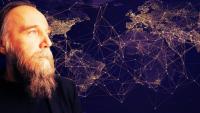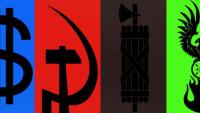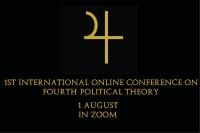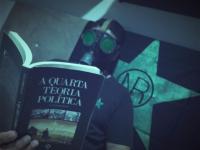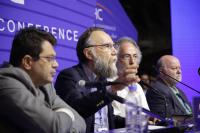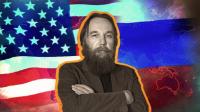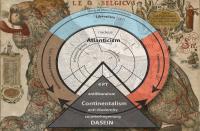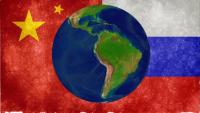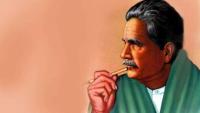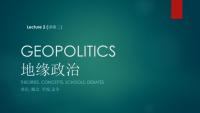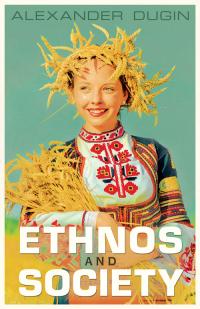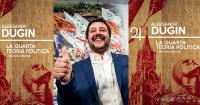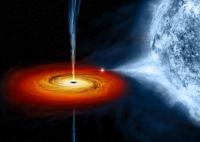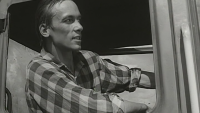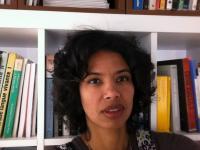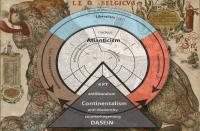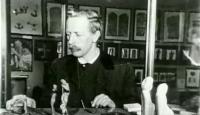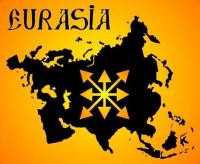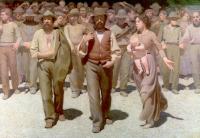Theory
Nationalism in the Third World & the idea of a Fourth Political Theory
The anti-imperialist struggle, in political contemporaneity, possesses a radically third-worldly, patriotic, anti-systemic and multipolar characteristic.
The political blocks underlying the current conflicts do not consist of all those old ideological blocks which used to dispute hegemony during the Second World War and, subsequently, during the Cold War anymore. Said in a different way, politics in concrete, today, is not expressed anymore through a tri-partition between American liberalism, Soviet communism and Italo-German fascism, and much less between a dual division between a capitalist block and a socialist block.
Fourth Political Theory and Socialism in Latin America
In the last two months of 2020, we have participated in several collaborative instances with intellectuals and activists from the anti-imperialist struggle around the world. On November the 19th, as a representative of the Circle, I exposed in the international conference “Multipolar Alternative for Latin America: Geopolitics, Ideology and Culture” (Alternativa Multipolar para América Latina: La Geopolítica, La Ideología, La Cultura). In such occasion, and exposing the topics which I already had addressed in my text: “The Fourth Political Theory or a Thinking for Latin America”, I was able to appreciate many good lectures such as the ones from Vicente Quintero (Venezuela), Pavel Grass (Brazil), Nino Pagliccia (Canada/Venezuela), Valerii Korovin (Russia) among many others, and coinciding with them in many viewpoints. Professor Alexander Dugin’s lecture standed out in which he made the unmissable invitation to the peoples of Our America in order to address its problematiques from the Fourth Political Theory (4PT), this time making a proposal to think a new kind of Socialism, which would distinguish itself from the older one and also from the liberal left (“liberal-bolsheviks” as they are being called with some sarcasm).
A LIBERAL NIGHTMARE: THE RISE OF THE FOURTH POLITICAL THEORY Primary tabs
As a matter of fact, Dugin’s Fourth Political Theory as a new political alternative opposes the geopolitical and ideological victory of liberalism over communism and fascism. For Dugin, liberalism as a foundational basis of Capitalism reached its peak during the cold war and hence, began disintegrating in the post-cold war era, when it became unchallenged. In this way, the unchallenged post-liberalism came into close association with postmodernity. Unfortunately, today it is the postmodernity that defines post-liberalism—, which illustrates the complete relegation and refutation of liberal history.
1st International online conference on Fourth Political Theory
By the close of the 20th century, the violent battle between the three political theories of Modernity, i.e. Liberalism, Communism and Fascism, ended with the spectacular worldwide victory of the First Political Theory, Liberalism. This yielded the unipolar moment, Francis Fukuyama’s declaration of the “End of History” (as it at least seemed to be so in the 1990s), and globalization. “One World” began to be discernible based on one universal ideology – liberal globalism. In the 1990s, the overwhelming majority of analysts and experts, public figures and political scientists were inclined to believe that henceforth the economy and civil society would gradually replace politics and competition among nation-states. This created a new paradigm of truths and new obligatory epistemological criteria, such as those represented by such trends as cognitivism, techno-science, political correctness, and “LGBT+ culture.” This unipolar moment lasted until the year 2000, after which something went wrong (for the First Political Theory). The 9/11 attack, the gradual recovering of sovereignty of Putin’s Russia, the spectacular rise of China, the populist wave in Europe, and finally Trump’s election marked symptoms of the fact that Liberalism is in trouble, submerged in a crisis that has become more and more serious and irreversible.
Brief Draft of a Methodology for the Fourth Political Theory
Having said this, we consider that the reading of the aforementioned work reveals, in between the lines, a specific methodology, so to speak, a way of universal action to be adopted apt to allow the construction of positions informed by the Fourth Political Theory on the most diverse topics and in the most diverse areas of knowledge. In this sense, regarding the methodology, we are talking about something which belongs to the “praxis”, but in the measure in which this methodology depends on the comprehension of the Fourth Political Theory in order to be unveiled and, simultaneously, points towards the work of permanent construction of the same, this also belongs to the “theory”.
Fourth political theory: the quest for Eurasianism
The past is a Foreign country, these are the famous words of V.I Hartley but future is a quest; a quest for destiny, a quest for identity and a quest for order. History has always been ambiguous because facts are hard to establish, and reality is built on prejudices, misconception and ignorance of our perception and knowledge. When we talk about the twentieth century, it ended with the end of ideological conflict and marked the beginning of a new era in which ordinary masses began to define themselves in terms of culture and religion.
WHY WE NEED NEW POLITICAL THEORY (4-TH POLITICAL THEORY)?
Today we assist not only huge geopolitical transformations in the balance of leading world power (the shift from unipolarity to multipolarity), but as well the deep ideological changes. Concretely in the Middle East we see how important is still the role of USA, Israel and European Union on one hand, how Russian and China presence changes the situation in region, and how different Islamic countries and different tendencies in Islam confront or ally with each other. So there is ideological – sometimes theological dimension behind the geopolitics and we cannot any more reduce the problems to simply national States competition or East-West ideological opposition. We need new tools of analysis that would explore the ideological ground and project it on the geopolitical map. We are in need of new kind of mapping the space. And that concerns Middle Eastern space much more than any other. Because it is here where main trends are redefined now.
POPULISM: THE RULE OF THE PEOPLE AND THE NEW GLOBAL IDEOLOGY
Why are we talking more about liberalism? Because, unlike the ideological conditions of the twentieth century, today socialism is not particularly influential and, moreover, does not have the ability to totalitarianly dictate its ideological principles. Also, socialists today have almost no influence on the definition of basic legal categories. And if they do, then in the case of China or North Korea, then only on a regional scale and moreover, an adequate assessment of this influence requires a thorough analysis of such legal systems as Chinese or North Korean. And there everything is far from what it seems to an outside observer. But it goes without saying that the ban on ideology should concern not only liberals, but also leftists.
The Fourth Political Theory seen from Uruguay
Pyotr Volkov: In Central America, the US political domination existed long before it reached South America. The US political and cultural domination of the South America began after 1947 with the demise of the British empire and the start of the Cold War. Britain’s domination of our economy brought us a lot of technological progress but U.S domination of our economy brought the very opposite. If it wasn’t for the anti-Yankee sentiment, the U.S would had brought our people down to the Middle Ages.
Iurie Roșca: You are writing a lot in your book about Russian Orthodox Faith and about spiritual issues in general. Is it because of your Russian roots or because of your interest in the spiritual decadence of Modernity? As we all know such decadence grew catastrophic during the current historical period of globalization and the Western ”culture of death”
Pyotr Volkov: I must admit that my preoccupation for the spiritual decadence of Modernity is something painful that sometimes it keeps me awake at night, it just makes me sick. Despite my distant Russianroots, I felt like some kind of superior force or reason guided me all along this path. Following this path is the entire reason of my earthly existence, anyone is in need of a true reason to live or die.
MUHAMMAD IQBAL, EURASIANITY, AND THE FOURTH WAY
It is significant that the Eurasianists rejected all three of these projects (and political theories), and even exposed their disastrous nature. The Eurasianists also predicted the collapse of the Soviet Union from the very onset of its establishment. The Eurasianists discussed the importance of religion to the life of the people and the state, and the Eurasianists insisted on the peaceful coexistence of cultures and ethnoi. Although the Eurasianist movement proper existed only during the interwar period, it found successors in the Soviet Union and now in contemporary Russia. Of extreme interest in this regard are the ideas of the philosopher Alexander Dugin, who has proposed the model of a Fourth Political Theory. This variation of “society D” continues the line of classical Eurasianity and rejects the three historical political theories of Liberalism, Fascism, and Communism. If Muhammad Iqbal spoke of the need to obtain the collective self (Ijtimayi Khudi) for a new society, then Professor Dugin is employing the terminology of the German philosopher Martin Heidegger in speaking about the Selbst and Dasein.
Geopolitics: Theories, Concepts, Schools, and Debates
Chaos strategy does not suggest creation or a new political system or order instead of the destroyed political systems. It is manipulated, moderated chaos - a new way of strategic thinking. If we carefully read Brzezinski’s book, The Grand Chessboard, it is written that they need a balkanized Eurasia, to transform it into a zone of permanent conflict between different groups - between Muslims, between ethnic groups, between Russians and Ukrainians, for example. This was Brzezinski’s idea. Chaos is already sown in Africa, so they don’t have to bother too much about that, while now the Russians and Chinese are coming here to bring another order, maybe not the best, but not bloody chaos as is the current situation. There are different points - smaller proxies, partly India, partly some pro-Western little states, and Israel for aggravating and make the chaos bigger. Smaller proxies, like Ukraine for example, are not allies in this concept, but just points in order to make chaos bigger. That is more or less how they understand the situation.
The Solar Hounds of Russia
Every thing is what it is thanks to its borders. After all, it is they that separate it from another thing. This distinction carries the most important meaning of the concept of the border not just for international law, defense doctrine, or the structuring of a country’s armed forces, but also for philosophy as such. The border is not just an instrument of philosophy, but its essence, seeing as the highest philosophical concept – transcendence -in Latin literally means “that what lies on the far side of the border”.
The border externally reflects that which lies inside it, while simultaneously confining the essence of the thing in its confrontation with other things. The border is something sacred. The ancient Greeks knew a special god, Terminus, whose name meant ‘limit’, ‘border’. This was not just the guardian-deity of borders, but a “border-deity”, a kind of special, sacred concept that played a central role in the worldviews of the ancient Indo-European peoples.
In magic, there also exists the important concept of the “Guardian of the Threshold”, a special being that is located at the intersection of two worlds: the beyond and the present, the vulgar and subtle, that of life and that of death, the waking world and the dreaming world. This is the very same ancient Terminus, with only slight modifications.
A GERMAN MIND IN THE RUSSIAN ACADEME: ETHNOS & SOCIETY
This is also where some of his most useful observations are found—his discussion of potlatch, for example, the ethnic destruction of property to demonstrate power, can be very useful in understanding the tendency of certain demographics to riot as a means of demonstrating or celebrating power. Civilized societies, of course, consider such riots as counter-productive because when a fully realised narod riots, it is usually an expression of frustrated powerlessness, not a demonstration of social power. Dugin enables us to draw qualitative distinctions having nothing to do with environment or circumstance between the bread riots preceding the French Revolution and the Ferguson and Baltimore riots following the death of Black criminals in the United States or the more recent riots in places like Johannesburg. Another interesting observation is his understanding of slavery as a function that only higher civilization, the narod, is truly capable, since slavery creates irreconcilable contradictions within the structure of the ethnos. The primitive ethnos has no category for a slave, since the balance of the ethnos requires the “other” to be an absolute evil to be destroyed, while a slave is allowed to exist and remain “other” to the ethnos (he observes that the Egyptians referred to slaves as “living dead” for this reason – those who by all right should have been deprived of life but instead were kept alive to become tools for ethnic labour). The necessary connexion of slavery with complex societies and higher thought is rich fodder for Reactionary thought in particular.
ETHNOS AND SOCIETY: REVIEW
Where right-wing liberals and conservatives preach “you can’t do anything against the progression of modernity, it’s only possible to gradually influence the process”, Alexander Dugins Ethnos and Society tells you the exact opposite: When one realizes the fact, that there are still ethnic societies around this planet in the Amazon, that the Muslim communities of the Middle East still live in the community of their narod, that in Russia and India the modern nation state is just a thin layer, then it’s obvious that the decay of modernity is just a possibility and not our destiny. If we want to continue the suicide of Europe and follow modernity to its conclusion and change nothing. But if we want to restore our tradition and ensure the existence of our people, we have to radically change our habits, morals and our way of life.
Whereas The Fourth Political Theory tells us to return to pre-modernity in order to protect our Dasein (narod), Ethnos and Society shows us how the preconditions for a return to pre-modernity work. Therefore, Ethnos and Society, is not only important to better understand the work of professor Dugin, but also in order to fight post-modernity to the last blood. If one doesn’t let oneself be scared off by the theoretical depth of this book, it’ll greatly improve one’s understanding of the current processes of globalization, decadence and the Great Replacement. This book is exactly what all the right-wing populist parties in Europe would need in order to change their policies of fake populism and realize what is really necessary to revive European identity.
The Fourth Political Theory and the Italian Logos
The Fourth Political Theory treats the concept “narod” as an independent legal and philosophical category, beyond its interpretations in the context of the three political theories of Modernity. But the “narod” is understood existentially, as Dasein. Heidegger’s formula “Dasein existiert völkisch” is key. The Fourth Political Theory understands the narod, the populus, as Dasein, Volk als Dasein. That makes the phenomenon of populism not indistinct, chaotic, and spontaneous, but deeply grounded, philosophical, and avant-garde. In this case, the Fourth Political Theory can be regarded as a “metaphysics of populism,” explaining its appearance and supplying the blind protest of humanity against the satanic elite that has seized power over it with a strategy, consciousness, thought, a system, and a plan of struggle.
To conclude this preface to the Italian edition, I want to emphasize: the Fourth Political Theory appeals to everyone – to traditionalists, socialists, liberals, conservatives, persons with convictions and persons without convictions. It is an invitation to think, and not the imposition of ready-made judgments or models. Our goal is to awaken in Italian society an interest towards political philosophy, towards ideas and towards an acute – truly Italian – perception of reality.
CHRISTIANITY AND SCIENCE
If one takes the third position on religion and modern science, life will become difficult (perhaps even unbearable). In this case, we must not only distrust the ideology of the modern (definitely non-Christian, often directly anti-Christian) society, but also the world itself, which, if we think about it, is pushed onto so heavily onto us by the entire structure of upbringing, education, study, and culture that we are convinced that it is reality, nature, existence, truth. Once can debate an ideology (although this is difficult, if it is a totalitarian one like all Modern ideologies: communism, fascism, and the most totalitarian one of all, liberalism!), but to distrust one’s own sensory organs, to see that which ‘isn’t’ behind ‘natural’ phenomena (as was said to us by our parents and teachers), i.e. the cosmological power of angels and demons is a direct road to insanity.
I do not know the answer to this question, as it can neither be easy nor understood. I can only express certain assumptions without being confident in neither their effectivity nor their ability to change anything.
First, we must give ourselves the task of fundamentally researching the philosophy of Plato and Aristotle. This demands effort, but it is the foundation of Christian thought. Without Plato, the fundamental theological theses of the Cappadocian school, or even the most fundamental teachings about the Trinity, creation, etc., to say nothing of the Aeropagites, asceticism, or hesychasm would have no foundation at all. The fundamentals of Christian theology were developed by the Platonists. And it is Platonic cosmology (with Christian corrections) that was patched into this philosophy. In the Christian context, this corpus is most clearly represented by the Aeropagites, in the West by Scotus Eriugena.
IN DEPTH: Nationalism in the Third World and the Idea of a Fourth Political Theory
e are talking about ideologies such as Chavismo in Venezuela, undoubtedly patriotic socialist doctrine, based on the political creativity of Hugo Chavez, who managed to forge a Fourth Way in relation to liberal-capitalism, communism and chauvinistic nationalism, reconciling its Peronist and Velasquist influences with perspective of a Communal State based on the productive autonomy of the workers. Your purpose? As outlined in his Plan de la Patria, establishing a multipolar and pluricentric world order and effectively building a socialism based on patriotic values in Venezuela.
THE ECONOMIC PERSONALITY
The pure individual must be a carrier of physical immortality, as there will be nothing in him that could die. There should be no hint of structure or filiation in him. He should be fully liberated of all forms of collective identity and also of existence. This is the ‘end of economics’, the ‘death of the person’, while at the same time being the flowering of chrematistics and the immortality of the (post-human) individual.
The seed of the human rots, but in its place there is no resurrected life, but a simulacrum, an electronic Antichrist. Capital is etymologically related to head (the Latin caput), i.e. capital has historically been a preparation for the coming of artificial intelligence.
So what does the economic aspect of the Fourth Political Theory, which challenges liberalism in its final (terminal) stage, consist of?
We must theoretically affirm a radical return to the integral worker, to the economic person against the disintegrated capitalist ‘order’ (organized chaos to be more precise) and the chrematistic individual. This means radical de-urbanisation and a return to agricultural practice, to the creation of sovereign farmer’s communities. This is the 4PT economic program: the resurrection of economics after the dark night of chrematistics, the rebirth of the economic person from the abyss of individualism.
THE REALM OF THE FOURTH POLITICAL THEORY: CONTRIBUTIONS
According to Ultra-modernity, everything that is said now will be claimed wrong within, say, twenty years. Remember, though, that you will be a grandparent yourself. So, are you ready to be thrown in the trash can in your days of old? Or will you simply refuse to grow old, considering aging a disease and trying to stop it? Because these are the days we are living: we will have to work hard for the right of being both right and old.
There is a very simple test that you can make, even if you do not know much about Geopolitics or Political Philosophy, to see on what side you are. It goes like this: if your people/territory/identity accepts most tenets of the Western culture, will the best ways of your grandparents fade or will they blossom?
POST-ANTHROPOLOGY
A concrete (phenomenal) society always consists of two parts - the aboveground and underground. The aboveground part is what we normally term “society", meaning a sphere of rational activity where logos (λόγος) prevails. This is the domain of the “diurnal". The underground part is the dark, underwater island of the collective unconscious, the region of the social night (the “nocturne”), where myth (μύθος) rules.
For some time, progressivist science believed that these two parts were situated in diachronic order. In ancient times (and among “primitive” peoples, the unfortunate “residue” of ancient times), myth was predominant. But the progress of civilization gradually supplanted the mythological order and replaced it with an order based on logos. The community, or Gemeinschaft, is superseded by society, or Gesellschaft (F. Tönnies). But this optimistic exaltation did not last long. Whereas blind faith in purported progress reigned almost unquestionably in 18th-19th century Western Europe, the subconscious, where the eternal and unchanging laws of myth predominate, was discovered by the beginning of the 20th century.
Fourth Political Theory: shortest presentation
The problem is where can we find the fulcrum? The Modernity and Post-Modernity - precisely by means of Third Totalitarianism (this time liberal one) - have destroyed already the humanity and replaced it by the assembly of individuals (human rights doctrine). Refusing normative subject of all-pervading liberalism (individual and - in the near future - post-human species) we are in the void because liberalism doesn’t accept institutionally (!) any form of non-individual onthology and anthropology. And the pre-modern version of subject, of human nature are considered to be obsolete and miserable – in the extreme case criminal. If we insist nevertheless they will qualify as the residui and treat us in the same manner as in the first stage of Enlightenment - simply killing us as Jacobins and bolsheviks killed the Christians priests and princes. May be it is an option for certain men and women. The way of martyrdom is great path.
But there is other solution. Not being able to certify our own existence in the conceptual field of totalitarian liberalism we can make appeal to Heideger's concept of Dasein. When the concept of human being is obligatory fake and the liberal totalitarian culture splits the human figure more and more depriving it of any order or unity as well as of any collective identity (more than that --depriving it of any identity at all) Dasein nevertheless is here - it is always here or rather t/here. It is here - existing in authentic or inauthentic way, but it is here! So 4PT invites to take Dasein as the axial fulcrum when everything else is missing. The return to the Tradition and to the Eternity can be accomplished neither by individual nor by class or nation. Dasein is the ontological root of the human being, the nucleus of Being. Dasein can be put in the wrong way of functioning but still it is present. So it is our final argument and the main feature of 4PT. Fourth Political theory is existential. And starting from Dasein we can make the eschatological leap to the Tradition. Else we would lack the foothold. Traditionalism is to be existential otherwise it will be but one simulacrum more.
On the Question of Russian Runes
There exist several points of view as to what runes are. Some believe that runes are an altered version of the Latin alphabet that appeared in the 5th-6th centuries among the Scandinavians and Northern European Germanic peoples. Others suggest that runes were the ancient characters used for divination and recording texts which emerged only at a later stage and under the influence of Latin writing. These two points of view on the nature and origin of runes are considered to be the “scholarly” and “orthodox” ones.
But there is another theory of runes proposed by the German scholar, Professor Herman Wirth. We should mention from the outset that this theory is not recognized by broader scholarly circles. The reason for this neglect of Wirth is not so much his paleo-epigraphic and runological works as his assessment of the text famously known as the Oera Linda Chronicle, the story behind which resembles that of the Book of Veles. The Oera Linda Chronicle was discovered at the beginning of the 19th century and allegedly presented the most ancient history of the Germanic peoples (the Frisians) stretching back centuries to many millennia. The text was written in a special quasi-runic script and contained tales of pre-Christian mythology and the sacred history of the Germanic people. The Book of Veles (discovered only at the beginning of the 20th century) represented a precise analogue of the Oera Linda Chronicle, only applied to the Slavs.
Eurasia: A Special Worldview
The West believes that only its path of development, only its logic, and only its values are universal and common to all of mankind, and that all other peoples have simply not yet understood this. This means that the West, albeit temporarily (until they understand this), can and is even obliged to rule others. With such a blatant agenda, the West has in practice managed to colonize the East. This is no easy feat, but it managed to. But the West faltered in the face of Russia, Eurasia. We, Russians, opposed the West with something that stopped it in its tracks. It repeatedly tried to take us by force and ruse, but we held on. The East fell, but we didn’t. And we are holding out to this day. This is Eurasia as an idea.
Eurasia means not succumbing to the West’s claims to universality, rejecting its hegemony, and insisting that no one has a monopoly on truth, especially not the West. Eurasia is the possibility for peoples and civilizations to follow their own path and, if the logic of the path demands such, not only a non-Western one, but even an anti-Western path. This is Eurasia. This idea was understood by the first Eurasianists, Trubetzkoy, Savitsky, and Alekseev in the 1920’s. We too understand it. And Vladimir Putin understands it, since there is no other meaning of Eurasia.
Modern Populism
The people as a political concept is appearing today in opposition to liberalism. The liberals are hollering about a fascist or communist-fascist threat, and they are incapable of understanding the essence of the populist moment, which they interpret through old clichés. Hence why they are losing. Hence why they are doomed.
And yet both left and right are unanimous in thinking that this is only a moment, a limited period of time, a kind of quantum in historical movement. Probably no one can say whether the People and consequently populism is a system, program, strategy, or merely a temporary correction on the path of liberal globalization. The globalists had their moment in the early ’90’s – the unipolar moment. They ruined everything they could over thirty years, turning globalization and the unipolar world into a hideous caricature. The reformers in Russia in the ’90’s did the same with democracy. Now a different moment is arriving. The people is appearing on the stage of world history. This is a chance, a risk, a responsibility, and a challenge. But it is our moment. Not utilizing it would be a real crime.
Yes, that’s right, not taking advantage of such a populist moment would be foolish and even criminal. But is there such a crime that we have not yet committed? Alas, everything rests on our shoulders. Nevertheless, this is a wonderful, open opportunity for a true alternative, a Russian alternative.

